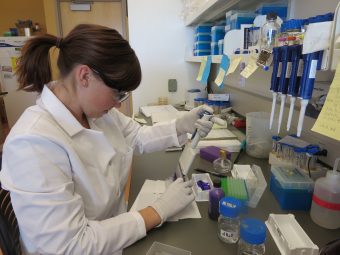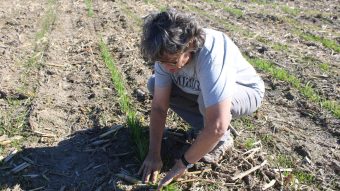December 6, 2019
Contact: Brian Consiglio, 573-882-9144, consigliob@missouri.edu
According to the United Nations, the world’s population is projected to exceed 9 billion people by 2050 and 11 billion by 2100. One of the biggest challenges this population growth creates is producing enough food to feed so many people.
Two University of Missouri graduates are working to solve this growing challenge. Brian and Katie Thompson are not only husband and wife, but also two of the three co-founders of Elemental Enzymes, a biotech company headquartered in St. Louis that makes agriculture products to help increase plant health, growth and overall food production. These products range from seed treatments to fertilizer enhancements.
Many of the products contain patented technology that Brian Thompson helped to discover while holding a post-doctoral research position at MU, where he also earned a master’s degree. During his time on campus, Thompson worked with George Stewart, professor and chairman of the Department of Veterinary Pathobiology in the MU College of Veterinary Medicine and a primary investigator at the Christopher S. Bond Life Sciences Center, as well Chung-Ho Lin, an associate professor in the MU College of Agriculture, Food and Natural Resources.

“Brian co-founded a company that utilizes the technology developed at MU to make products that are beneficial to the agriculture industry,” Stewart said. “It is not only a good story of MU student success, but one that benefits the state of Missouri and Midwest region as well.”
Thompson’s research began in Stewart’s lab at the Christopher S. Bond Life Sciences Center, where the original innovations that eventually launched Elemental Enzymes were first developed. Thompson also developed the company’s business plan at the MU Life Science Business Incubator at Monsanto Place.
“Brian Thompson was a co-inventor, along with Drs. Stewart and Lin, on the intellectual property that was patented by the university and licensed to Elemental Enzymes,” said Sam Bish of the MU Technology Advancement Office. “MU provides individuals with the opportunities, infrastructure and interactions to do commercially attractive research that impacts various sectors of society, such as the agricultural industry, to help find solutions to important problems, such as feeding a growing world population.”
Elemental Enzymes, founded in 2011 at MU, is now a self-sustaining company with offices in St. Louis, Columbia and Jacksonville, Florida. Its agriculture products are on more than 6 million acres of American farmland, contributing to more than 1 billion additional pounds of corn grown in the United States. Enzymes are biological catalysts that accelerate chemical reactions, and when applied to agricultural products, they improve plant health, performance and yield.

“Enzymes are the next wave of great innovation for crop, fruit and vegetable production, and we are proud to be on the forefront of bringing enzyme technologies to improve food production both domestically and internationally,” Brian Thompson said. “The patents from Mizzou support our product lines, current and future, and protect our inventions so that we can continue to develop protected products to bring to growers."
Katie Thompson, the company’s chief operations officer, earned a doctoral degree at MU in molecular and cellular biology. She credits her education and experience at MU for helping her find solutions to some of agriculture’s toughest challenges.
“My education at Mizzou set the foundation to being able to start and lead a biotech company,” Katie Thompson said. “It taught me how to approach and solve complex problems, and gave me the core expertise to be able to develop technology from the concept stage and apply it to commercial products that make a real-world impact.”
In addition to helping with disease prevention and animal health, Elemental Enzymes’ products allow seeds to absorb nutrients more efficiently.
“In Missouri and throughout the Midwest, farming products are not in climate-controlled settings and must endure extreme temperatures,” Katie Thompson said. “Our stabilized enzymes allow our products to survive these harsh conditions and ultimately improve agricultural productivity.”

Bayer, a major multinational company, has licensed several of Elemental Enzymes’ products. Now with 36 employees, Elemental Enzymes offers competitive salaries, full benefits and opportunities for advancement due to their rapid growth.
“It feels good to create jobs that people enjoy, opportunities for advancement, and be at a company that myself and others are proud to be a part of,” Katie Thompson said.



